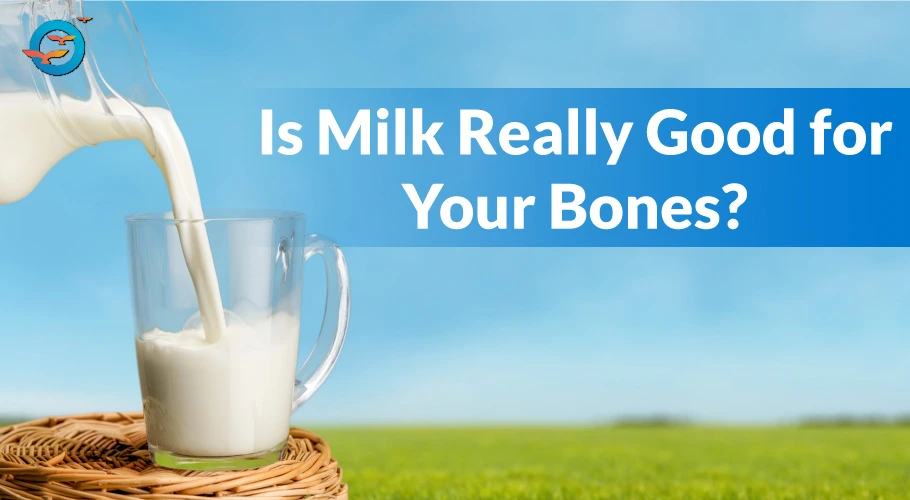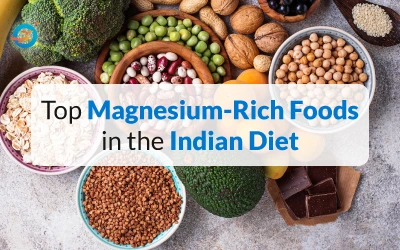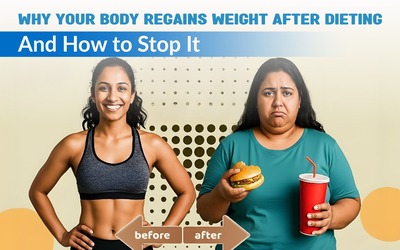Is Milk Really Good for Your Bones?

Don't Drink Milk If You Want Strong Bones: What’s the Truth About Calcium and Milk?
India consumes an astonishing 427 g of milk per person daily, far above the global average of around 310 g (FAO). Yet, we still account for 25% of global osteoporosis cases (IOF). Clearly, drinking milk alone isn't enough. If you're relying on dairy to keep your bones strong, it may be time to rethink. Let's explore how you can get stronger bones through a milk-free calcium diet that is richer, healthier, and better suited for Indian bodies.
Why Milk May Not Be Ideal for Bone Health?
1. Acid Load Can Leach Calcium from Bones
Milk itself is not acidic, but our typical diet full of tea, coffee, sugar, refined flour, and processed snacks creates acidity. Your blood must remain at a pH of around 7.4. Calcium is pulled from bones to neutralize the acid. Over time, this leads to mineral loss and bone thinning.
2. Poor Calcium Absorption Due to Lactose Intolerance
Studies show nearly 70% of Indians are lactose intolerant (Indian Journal of Medical Research). If you're among them, milk may do more harm than good causing bloating, indigestion, and poor calcium absorption.
3. Rampant Vitamin D Deficiency
Even if you're consuming calcium, Vitamin D deficiency affecting 70–90% of Indians (AIIMS) prevents effective absorption. So, that daily glass of milk may not do what you think it is.
Why Choose Milk Alternatives for Calcium?
Plain milk gives just 120 mg of calcium per 100 ml, according to the USDA. In contrast, several non-dairy calcium sources offer higher quantities, fewer side effects, and better overall nutrition. It's no wonder more people are shifting to a milk-free calcium diet and thriving.
Which Indian Foods Are Rich in Calcium Without Milk?
These calcium-rich Indian foods are easy to include in your diet and pack far more nutritional punch than milk:
- Sesame Seeds (Til) – 975 mg calcium per 100 g
- Chia or Sabja Seeds – 630 mg
- Tofu (Soy Paneer) – 350–680 mg
- Almonds – 250 mg
- Ragi (Finger Millet) – 344 mg
- Green Leafy Vegetables – Over 200 mg (e.g., moringa, amaranth, fenugreek, spinach)
These are not just milk alternatives for calcium they're superior sources.
How to Get Calcium Without Milk?
Here are simple ways to build a milk-free calcium diet at home:
- Sprinkle til (sesame) seeds over salads or make til chutney.
- Add sabja seeds to water, smoothies, or coconut milk.
- Use tofu instead of paneer in curries and stir-fries.
- Include leafy greens like moringa and amaranth in your dal or sabzi.
- Eat soaked almonds as a snack.
- Use ragi flour for roti, dosa, or porridge.
- Get 15–20 minutes of sun daily for Vitamin D activation.
This approach helps you get calcium without milk and supports stronger bones in the long term.
Conclusion
If you thought dairy was your only defence against bone loss, think again. With powerful calcium-rich vegetables, seeds, grains, and nuts at your fingertips, you can build stronger bones without milk. Adopting a milk-free calcium diet doesn't just avoid discomfort. It improves calcium absorption, prevents acidity-related loss, and aligns with our Indian lifestyle and digestion.
To read more about vegetables for diabetes, visit our blog.
FAQs
Can I get enough calcium without drinking milk?
Yes. Many plant-based options like sesame seeds, leafy vegetables, tofu, and almonds offer more calcium than milk.
Which leafy vegetables are rich in calcium?
Moringa, amaranth, fenugreek, curry leaves, and spinach are all calcium-rich vegetables that enhance bone strength.
Are nuts a good source of calcium?
Absolutely. Almonds contain around 250 mg of calcium per 100 g, making them one of the best non-dairy calcium sources.
Why should I avoid milk for calcium?
Milk may not be absorbed well if you're lactose intolerant. It also doesn't help if you're Vitamin D deficient. Plus, it can contribute to calcium loss due to acidity.
What are the best non-dairy foods for calcium?
Sesame seeds, chia seeds, tofu, ragi, almonds, and leafy greens are excellent milk alternatives for calcium.
How can I maintain bone health without dairy?
Follow a milk-free calcium diet, include calcium-rich fruits and vegetables, get regular sun, and stay active.

